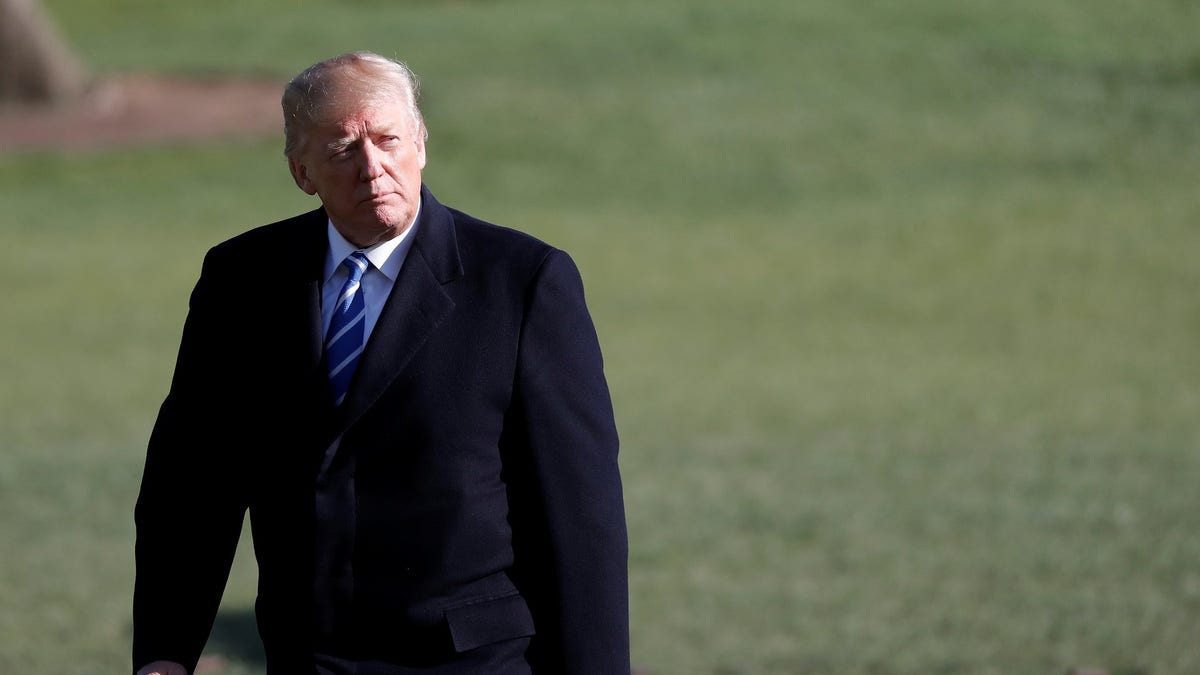
FILE -- President Donald Trump walks as he returns to the White House after a trip to Lewisburg, West Virginia, in Washington D.C., April 5, 2018. (REUTERS/Carlos Barria)
The poor legacy media. Donald Trump has been president for 15 months, and they’re still slathered in crazy sauce, desperately trying to prove that something went wrong, that none of this can be true.
The new insults come from Politico with the all the drama of a “Special Report” breathlessly announcing that the lack of — wait for it — subscriptions to newspapers and the death of local news is why President Trump won. The premise itself is false and is already being mocked and challenged.
In this case, Politico reviewed print newspaper subscription data and, “The results show a clear correlation between low [newspaper] subscription rates and Trump’s success in the 2016 election, both against Hillary Clinton and when compared to [Mitt] Romney in 2012 … That gives new force to the widely voiced concerns of news-industry professionals and academicians about Trump’s ability to make bold assertions about crime rates, unemployment and other verifiable facts without any independent checks.”
On its face, this is absurd, but “news industry professionals and academicians” have been triggered, compelling Politico to assume correlation implies causality. The overwrought effort declared Candidate Trump avoided mainstream outlets and as a result thrived because, “Voters in so-called news deserts — places with minimal newspaper subscriptions, print or online — went for him in higher-than-expected numbers.”
The Neiman Journalism Lab at Harvard, which describes itself “an attempt to help journalism figure out its future in an Internet age,” also took serious issue with almost every aspect of the Politico report. In an analysis titled, “The Politico article on ‘news deserts’ doesn’t really show what it claims to show,” they noted, “It is just ahistorical to say Trump’s campaign ‘succeeded in avoiding mainstream outlets.’ Candidate Trump gave tons of interviews throughout the primaries! And when he scaled those back in the general, one of his strategic shifts was shifting from national to local media! Whatever perfectly legitimate criticisms you want to make about how the media covered Trump, to say Trump“avoided” coverage in mainstream outlets is just … wrong.”
We do know that newspaper subscription rates have declined, but the claim that areas without subscriptions to hardcopy newspaper are “news deserts” is absurd. One of the reason hardcopy subscription rates are down is because of the Internet making that information freely accessible. This is, indeed, an issue for every print entity, not just news-based.
The Internet also has, in fact, brought more news and information to Americans who normally wouldn’t have access to a wide variety of information. But Politico’s claim of a news desert is based in the argument that only a select few legacy news outlets, which also provided columnists and news stories to local newspapers, are real, actual news.
“In the days before the Internet, about a dozen news outlets dominated national political coverage. They included the major television networks, weekly news magazines, The Associated Press, and about a half-dozen newspapers. Wire services such as The New York Times News Service and The Washington Post-Los Angeles Times service sent out their articles to smaller papers across the country, guaranteeing vastly wider circulation for their stories,” swooned Politico. “Top columnists and political writers would therefore appear in hundreds of newspapers, reaching tens of millions of homes. The families in those homes might have had little awareness of where the articles originated, but were reassured by knowing that trusted local editors had chosen those pieces for publication.”
You are reading this column either in The Washington Times newspaper, or on its website, where all its articles and columns are free and available to everyone, no matter where you live or economic status. The fact that “unapproved,” i.e. not liberal, commentary and perspective is generally accessible, is what this latest lamentation by the media establishment is all about.
For them, more information is the problem. Hoping to malign any non-conforming news source, the Politico report goes so far as to pretend anything that’s not within the pre-approved cabal doesn’t even exist.
Many in the establishment are growing even more resentful of the fact that they do not control the information you receive. Outlets like this newspaper, its online accessibility, and other online news sources like FoxNews.com, have broken the monopoly on news.
In the 1990s, the Drudge Report became the harbinger of the power of the Internet to resurrect news deemed unworthy by the establishment when Matt Drudge brought to light the Monica Lewinsky/Bill Clinton story, which Newsweek decided to spike.
Moreover, this report is a classic example of confirmation bias — seeing what you want to see because you expect to see it. Science Daily describes it as, “a type of cognitive bias and represents an error of inductive inference toward confirmation of the hypothesis under study.”
Establishment media remains desperate to prove Mr. Trump’s election was some sort of horrible mistake, so why not attach that to a theory that includes an underlying condemnation of the internet?
The internet hasn’t killed legacy media, it simply makes them more immediately accountable, which is the major driver of their undoing.
